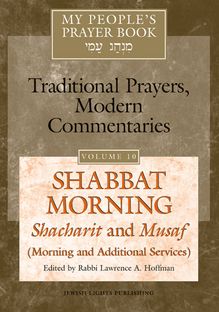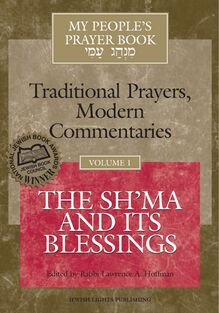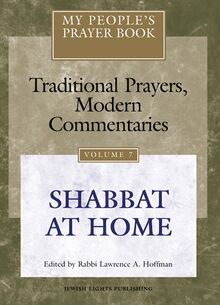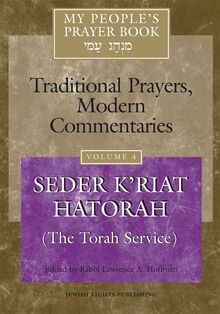My People's Prayer Book Vol 4 , livre ebook
201
pages
English
Ebooks
2013
Vous pourrez modifier la taille du texte de cet ouvrage
Obtenez un accès à la bibliothèque pour le consulter en ligne En savoir plus
Découvre YouScribe et accède à tout notre catalogue !
Découvre YouScribe et accède à tout notre catalogue !
201
pages
English
Ebooks
2013
Vous pourrez modifier la taille du texte de cet ouvrage
Obtenez un accès à la bibliothèque pour le consulter en ligne En savoir plus
Publié par
Date de parution
21 juin 2013
Nombre de lectures
4
EAN13
9781580237574
Langue
English
"The prayer book is our Jewish diary of the centuries, a collection of prayers composed by generations of those who came before us, as they endeavored to express the meaning of their lives and their relationship to God. The prayer book is the essence of the Jewish soul." This stunning work, an empowering entryway to the spiritual revival of our times, enables all of us to claim our connection to the heritage of the traditional Jewish prayer book. It helps rejuvenate Jewish worship in today's world, and makes its power accessible to all. Framed with beautifully designed Talmud-style pages, commentaries from 11 of today's most respected Jewish scholars from all movements of Judaism examine Seder K’riat Hatorah from the perspectives of ancient Rabbis and modern theologians, as well as feminist, halakhic, Talmudic, linguistic, biblical, Chasidic, mystical, and historical perspectives. This fourth volume of the series unfolds the many layers of meaning in Seder K’riat Hatorah, the ritual and prayers surrounding the communal reading of Torah. More than any other section of the prayer book, the Torah service reflects all of Jewish history. Vol. 4 helps us to understand how the reading of Torah is an affirmation, powerful and dramatic, of the continuing covenant between the community of Israel and God. Vol. 4—Seder K’riat Hatorah (The Torah Service) features the authentic Hebrew text with a new translation designed to let people know exactly what the prayers say. Introductions tell the reader what to look for in the prayer service, as well as how to truly use the commentaries, to search for—and find—meaning in the prayer book. Even those not yet familiar with the prayer book can appreciate the spiritual richness of Seder K’riat Hatorah. My People’s Prayer Book enables all worshipers, of any denomination, to encounter their own connection to 3,000 years of Jewish experience with the world and with God.
ABOUT MY PEOPLE'S PRAYER BOOK INTRODUCTION TO THE LITURGY: THE READING OF TORAH— RETELLING THE JEWISH STORY IN THE SHADOW OF SINAI Lawrence A. Hoffman CELEBRATING THE PRESENCE OF THE TORAH: THE HISTORY AND MEANING OF READING TORAH Ruth Langer THE THEORY AND HALAKHAH OF READING TORAH Daniel Landes INTRODUCTION TO THE COMMENTARIES: HOW TO LOOK FOR MEANING IN THE PRAYERS. Lawrence A. Hoffman THE LITURGY 1. INTRODUCTION: REMOVING THE TORAH FROM THE ARK. A. SETTING THE STAGE: ON ONE HAND, GOD'S GREATNESS I. "THERE IS NO GOD LIKE YOU" (EIN KAMOKHA) II. "FATHER OF MERCY" (AV HARACHAMIM) III. “WITH THE MOVING OF THE ARK” (VAY’HI BINSO’A HA’ARON) B. SETTING THE STAGE: ON THE OTHER HAND, GOD’S MERCY I. THE THIRTEEN ATTRIBUTES (ADONAI, ADONAI) II. “MAY THE WORDS OF MY MOUTH” (YIHYU L’RATSON) III. “I OFFER MY PRAYER” (VA’ANI T’FILLATI) C. SETTING THE STAGE: KABBALISTIC INSERTION ON GOD’S GREATNESS AND GOD’S MERCY I. “BLESSED IS THE NAME” (B’RIKH SH’MEIH) D.AFFIRMING GOD WHILE TAKING THE TORAH I. “HEAR O ISRAEL” (SH’MA YISRA’EL) II. “OUR GOD IS ONE” (ECHAD ELOHEINU) III. “PROCLAIM ADONAI’S GREATNESS” (GADLU) E. THE HAKAFAH: TAKING THE TORAH TO THE READER’S STAND: “GREATNESS, POWER, GLORY...ARE YOURS” (L’KHA ADONAI) 2. READING TORAH: THE ALIYOT A. SUMMONING THE ALIYOT: “MAY HE HELP, SHIELD, AND SAVE” (VA’AZOR V’YAGEN) B. BLESSINGS OVER TORAH C. SPECIAL CASES (DELIVERANCE FROM DANGER, BAR/BAT MITZVAH) D.“MAY THE ONE WHO BLESSED” (MI SHEBERAKH) E. CONCLUDING AFFIRMATION OF TORAH: “THIS IS THE TORAH” (V’ZOT HATORAH) 3. HAFTARAH BLESSINGS A. BLESSING BEFORE B. BLESSINGS AFTER 4. PRAYERS FOR THE COMMUNITY A. FOR THOSE OF ANTIQUITY: “MAY SALVATION ARISE” (Y’KUM PURKAN) B. FOR THE COMMUNITY TODAY I. “MAY SALVATION ARISE” (Y’KUM PURKAN) II. “MAY THE ONE WHO BLESSED” (MI SHEBERAKH) C. FOR THE GOVERNMENT: “THE ONE WHO GRANTS SALVATION” (HONOTEN T’SHUAH) D. FOR A MONTH OF BLESSING: BLESSING OF THE NEW MOON (BIRKAT HACHODESH) E. FOR OUR MARTYRS: “IN HIS GREAT MERCY, MAY THE FATHER OF MERCY” (AV HARACHAMIM) 5. CONCLUDING PRAYERS: RETURNING THE TORAH TO THE ARK A. REJOICING IN TORAH: “HAPPY IS THE ONE” (ASHRE) B. ISRAEL’S PRAISE OF GOD I. “LET THEM PRAISE” (Y’HAL’LU) II. “HIS MAJESTY IS ABOVE” (HODO AL ERETS) C.THE UNIVERSE’S PRAISE OF GOD (PSALM 29): “DAVID’S PSALM” (MIZMOR L’DAVID) D. “AND WITH ITS RESTING” (U’V’NUCHOH YOMAR) About the Contributors List of Abbreviations Glossary About Jewish Lights
Publié par
Date de parution
21 juin 2013
EAN13
9781580237574
Langue
English
R ead may be the wrong word. Engage would be better, because this is not so much a book as it is a classic text, and Jewish classics are not read so much as they are engaged. Included here is a classic text of Jewish prayer, spanning 2,000 years of Jewish experience with the world and with God; and nine thoughtful commentaries on that text, each one reaching back in a different way, again through 2,000 years of time. The question ought to be, Who should engage this book in personal dialogue?
If you like to pray, or find prayer services baffling: Whether you are Orthodox, Conservative, Reconstructionist, or Reform, you will find that My People s Prayer Book tells you what you need to know to pray. The Hebrew text here is the most authentic one we have, and the variations among the Jewish movements are described and explained. They are all treated as equally authentic. The translation is honest, altogether unique, and outfitted with notes comparing it to others translations. Of special interest is a full description of the Halakhah (the how to ) of prayer and the philosophy behind it.
If you are a spiritual seeker or Jewishly curious: If you have wondered what Judaism is all about, the prayer book is the place to begin. It is the one and only book that Jews read each and every day. The commentaries explain how the prayers were born, and synopsize insights of founding Rabbis, medieval authorities, Chasidic masters, and modern theologians. The layout replicates the look of Jewish classics: a text surrounded by many marginal commentaries allowing you to skip back and forth across centuries of insight.
If you are a teacher or a student: This is a perfect book for adult studies, or for youth groups, teenagers, and camps. Any single page provides comparative insight from the length and breadth of Jewish tradition, about the texts that have mattered most in the daily life of the Jewish people.
If you are a scholar: Though written in friendly prose, this book is composed by scholars: professors of Bible, Rabbinics, Medieval Studies, Liturgy, Theology, Linguistics, Jewish Law, Mysticism, and Modern Jewish Thought. No other work summarizes current wisdom on Jewish prayer, drawn from so many disciplines.
If you are not Jewish: You need not be Jewish to understand this book. It provides access for everyone to the Jewish wisdom tradition. It chronicles the ongoing Jewish-Christian dialogue, and the roots of Christian prayer in Christianity s Jewish origins.
The My People s Prayer Book: Traditional Prayers, Modern Commentaries series Volume 1- The Sh ma and Its Blessings 168 pp, 978-1-879045-79-8 Volume 2- The Amidah 240 pp, 978-1-879045-80-4 Volume 3- P sukei D zimrah (Morning Psalms) 240 pp, 978-1-879045-81-1 Volume 4- Seder K riat Hatorah (The Torah Service) 264 pp, 978-1-879045-82-8 Volume 5- Birkhot Hashachar (Morning Blessings) 240 pp, 978-1-879045-83-5 Volume 6- Tachanun and Concluding Prayers 240 pp, 978-1-879045-84-2 Volume 7- Shabbat at Home 240 pp, 978-1-879045-85-9 Volume 8- Kabbalat Shabbat (Welcoming Shabbat in the Synagogue) 240 pp, 978-1-58023-121-3 Volume 9- Welcoming the Night: Minchah and Ma ariv (Afternoon and Evening Prayer) 272 pp, 978-1-58023-262-3 Volume 10- Shabbat Morning: Shacharit and Musaf (Morning and Additional Services) 240 pp, 978-1-58023-240-1
Prayers of Awe Volume 1- Who by Fire, Who by Water-; Un taneh Tokef 272 pp, 978-1-58023-424-5 Volume 2- All These Vows-; Kol Nidre 288 pp, 978-1-58023-430-6 Volume 3- We Have SinnedSin and Confession in Judaism-; Ashamnu and Al Chet 288 pp, 978-1-58023-612-6
My People s Passover Haggadah: Traditional Texts, Modern Commentaries Volume 1- 304 pp, 978-1-58023-354-5 Volume 2- 320 pp, 978-1-58023-346-0
Thank you for purchasing this Jewish Lights e-book!
Sign up for our e-newsletter to receive special offers and information on the latest new books and other great e-books from Jewish Lights.
Sign Up Here
or visit us online to sign up at www.jewishlights.com .
Looking for an inspirational speaker for an upcoming event, Shabbaton or retreat?
Jewish Lights authors are available to speak and teach on a variety of topics that educate and inspire. For more information about our authors who are available to speak to your group, visit www.jewishlights.com/page/category/JLSB . To book an event, contact the Jewish Lights Speakers Bureau at publicity@jewishlights.com or call us at (802) 457-4000.
INTRODUCTION TO THE LITURGY: THE READING OF TORAH-RETELLING THE JEWISH STORY IN THE SHADOW OF SINAI
Lawrence A. Hoffman
CELEBRATING THE PRESENCE OF THE TORAH: THE HISTORY AND MEANING OF READING TORAH
Ruth Langer
THE THEORY AND HALAKHAH OF READING TORAH
Daniel Landes
INTRODUCTION TO THE COMMENTARIES: HOW TO LOOK FOR MEANING IN THE PRAYERS
Lawrence A. Hoffman
THE LITURGY
1.INTRODUCTION: REMOVING THE TORAH FROM THE ARK
A.SETTING THE STAGE: ON ONE HAND, GOD S GREATNESS
I. THERE IS NO GOD LIKE YOU ( EIN KAMOKHA )
II. FATHER OF MERCY ( AV HARACHAMIM )
III. WITH THE MOVING OF THE ARK ( VAY HI BINSO A HA ARON )
B.SETTING THE STAGE: ON THE OTHER HAND, GOD S MERCY
I.THE THIRTEEN ATTRIBUTES ( ADONAI, ADONAI )
II. MAY THE WORDS OF MY MOUTH ( YIHYU L RATSON )
III. I OFFER MY PRAYER ( VA ANI T FILLATI )
C.SETTING THE STAGE: KABBALISTIC INSERTION ON GOD S GREATNESS AND GOD S MERCY
I. BLESSED IS THE NAME ( B RIKH SH MEIH )
D.AFFIRMING GOD WHILE TAKING THE TORAH
I. HEAR O ISRAEL ( SH MA YISRA EL )
II. OUR GOD IS ONE ( ECHAD ELOHEINU )
III. PROCLAIM ADONAI S GREATNESS ( GADLU )
E.THE HAKAFAH : TAKING THE TORAH TO THE READER S STAND: GREATNESS, POWER, GLORY...ARE YOURS ( L KHA ADONAI )
2.READING TORAH: THE ALIYOT
A.SUMMONING THE ALIYOT: MAY HE HELP, SHIELD, AND SAVE ( VA AZOR V YAGEN )
B.BLESSINGS OVER TORAH
C.SPECIAL CASES (DELIVERANCE FROM DANGER, BAR/BAT MITZVAH)
D. MAY THE ONE WHO BLESSED ( MI SHEBERAKH )
E.CONCLUDING AFFIRMATION OF TORAH: THIS IS THE TORAH ( V ZOT HATORAH )
3. HAFTARAH BLESSINGS
A.BLESSING BEFORE
B.BLESSINGS AFTER
4.PRAYERS FOR THE COMMUNITY
A.FOR THOSE OF ANTIQUITY: MAY SALVATION ARISE ( Y KUM PURKAN )
B.FOR THE COMMUNITY TODAY
I. MAY SALVATION ARISE ( Y KUM PURKAN )
II. MAY THE ONE WHO BLESSED ( MI SHEBERAKH )
C.FOR THE GOVERNMENT: THE ONE WHO GRANTS SALVATION ( HONOTEN T SHUAH )
D.FOR A MONTH OF BLESSING: BLESSING OF THE NEW MOON ( BIRKAT HACHODESH )
E.FOR OUR MARTYRS: IN HIS GREAT MERCY, MAY THE FATHER OF MERCY ( AV HARACHAMIM )
5.CONCLUDING PRAYERS: RETURNING THE TORAH TO THE ARK
A.REJOICING IN TORAH: HAPPY IS THE ONE ( ASHRE )
B.ISRAEL S PRAISE OF GOD
I. LET THEM PRAISE ( Y HAL LU )
II. HIS MAJESTY IS ABOVE ( HODO AL ERETS )
C.THE UNIVERSE S PRAISE OF GOD (PSALM 29): DAVID S PSALM ( MIZMOR L DAVID )
D. AND WITH ITS RESTING ( U V NUCHOH YOMAR )
About the Contributors
List of Abbreviations
Glossary
About the Editor
About My People s Prayer Book
Copyright
Also Available
About Jewish Lights
Sign Up for E-mail Updates
Send Us Your Feedback
CONTRIBUTORS
MARC BRETTLER: Our Biblical Heritage
ELLIOT N. DORFF: Theological Reflections
DAVID ELLENSON: How the Modern Prayer Book Evolved
ELLEN FRANKEL: A Woman s Voice
JUDITH HAUPTMAN: Our Talmudic Heritage
JOEL M. HOFFMAN: What the Prayers Really Say
LAWRENCE A. HOFFMAN: History of the Liturgy
LAWRENCE KUSHNER AND NEHEMIA POLEN: Chasidic and Mystical Perspectives
DANIEL LANDES: The Halakhah of Prayer
RUTH LANGER: Celebrating Torah
The Reading of Torah-Retelling the Jewish Story in the Shadow of Sinai
Lawrence A. Hoffman
Liturgy can seem confusing, more like a shapeless mass of verbiage than a carefully constructed whole; a jumble of noise, not a symphony; a blotch of random colors, hardly a masterpiece of art. But prayer is an art form, and like the other arts, the first step toward appreciation is to recognize the pattern at work within it.
There are three daily services: morning (Shacharit), afternoon (Minchah), and evening (Ma ariv or Arvit). For the sake of convenience, the latter two are usually recited in tandem, one just before dark, and the other immediately after the sun sets. All three follow the same basic structure, but the morning service is the most complete. It is composed of seven consecutive units that build upon each other to create a definitive pattern. Though the words of each unit have been fluid for centuries, the structural integrity of the service has remained sacrosanct since the beginning.
Services are made of prayers, but not all prayers are alike. Some are biblical quotations, ranging in size from a single line to entire chapters, usually psalms. There are rabbinic citations also, chunks of Mishnah or Talmud that serve as a sort of Torah study within the service. Medieval poetry occurs here too, familiar things like Adon Olam or older staples (called piyyutim -sing. piyyut ) marked less by rhyme and rhythm than by clever word plays and alphabetic acrostics. And there are long passages of prose, the work again of medieval spiritual masters, but couched in standard rabbinic style without regard for poetic rules.
Most of all, however, the Siddur is filled with blessings, a uniquely rabbinic vehicle for addressing God, and the primary liturgical expression of Jewish spirituality.
Blessings (known also as benedictions, or, in Hebrew, b rakhot -sing., b rakhah ) are so familiar that Jewish worshipers take them for granted. We are mostly aware of short blessings, the one-line formulas that are customarily recited before eating, for instance, or before performing a commandment. But there are long blessings too, ge







